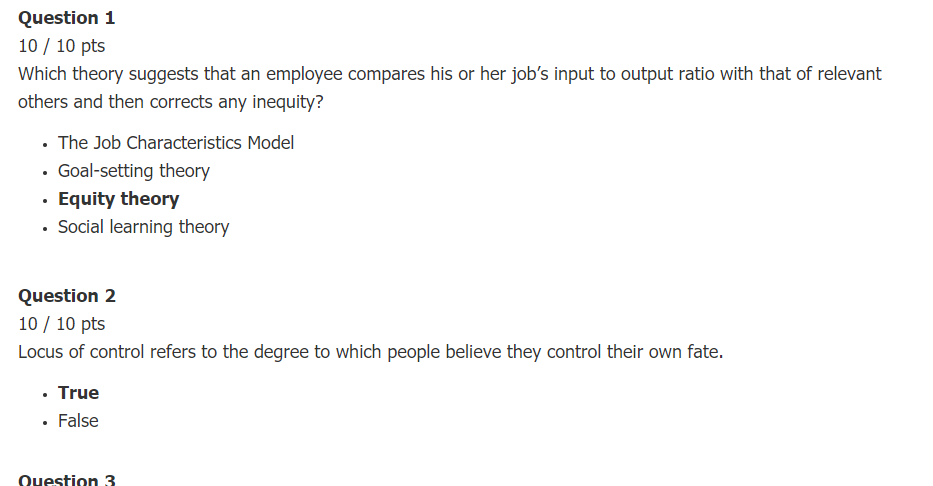(Solved): PAF 311 : Quiz: Module 5.1 : Score for this quiz: 100 out of 100 Submitted Apr 14 at 3:09am...
Quiz: Module 5.1
Score for this quiz: 100 out of 100
Submitted Apr 14 at 3:09am
This attempt took 22 minutes.
Question 1
10 / 10 pts
Which theory suggests that an employee compares his or her job’s input to output ratio with that of relevant others and then corrects any inequity?
- The Job Characteristics Model
- Goal-setting theory
- Equity theory
- Social learning theory
Question 2
10 / 10 pts
Locus of control refers to the degree to which people believe they control their own fate.
- True
- False
Question 3
10 / 10 pts
The degree to which the job affects the lives or work of other people is known as:
- Task significance.
- Task identity.
- Task variety.
- Autonomy.
Question 4
10 / 10 pts
Which component of attitude consists of employee beliefs, opinions, knowledge, and information?
- Cognitive
- Affective
- Behavioral
- Informational
Question 5
10 / 10 pts
The degree to which a job provides freedom, independence, and discretion to the employee in scheduling their work and deciding what procedures to best to accomplish tasks refers to:
- Task significance.
- Task identity.
- Task variety.
- Autonomy.
Question 6
10 / 10 pts
Organizational commitment refers to the degree to which an employee identifies with his or her job, actively participates in it, and considers his or her job performance important for self-worth.
- True
- False
Question 7
10 / 10 pts
Employee engagement is an individual’s identification and involvement in the organization.
- True
- False
Question 8
10 / 10 pts
Cognitive dissonance is any incompatibility or inconsistency between attitudes or between behavior and attitudes.
- True
- False
Question 9
10 / 10 pts
Distributive justice is the perceived fairness of the process used to determine the distribution of rewards.
- True
- False
Question 10
10 / 10 pts
The Big-Five factors of personality are:
- Happiness, Agreeableness, Conscientiousness, Emotional Stability, Openness to Experience
- Happiness, Agreeableness, Conscientiousness, Emotional Stability, Narcissism
- Extraversion, Fixed Mindset, Conscientiousness, Narcissism, Openness to Experience
- Extraversion, Agreeableness, Conscientiousness, Emotional Stability, Openness to Experience
Expert Answer

Buy This Answer $15
-- OR --
Subscribe $20 / Month
